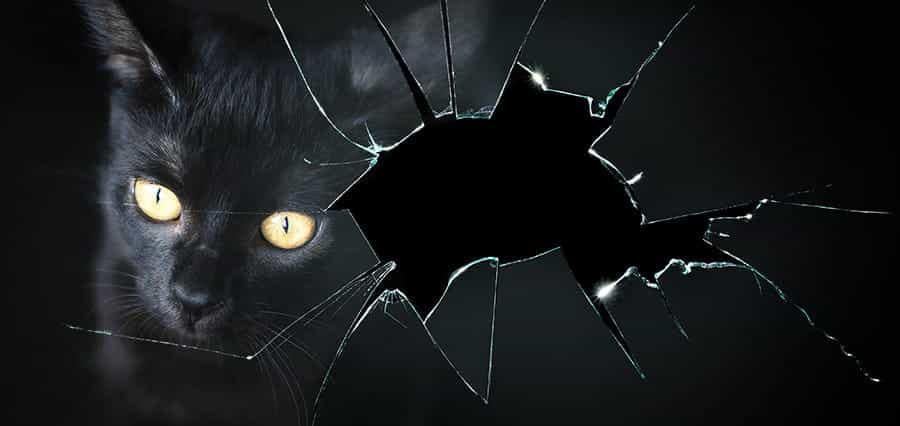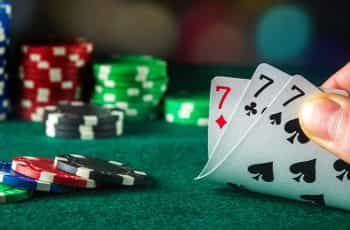
Britain is a country which has its own unique set of superstitions. Some of them have their origins from across the world. Let’s dive into the world of weird superstitions UK believes in. Here are the seven beliefs that the most superstitious people in Britain still hold.
1. The Number Thirteen
Although not exclusively part of the superstitions UK citizens believe in, the unluckiness of the number thirteen originated in the proximity of England, from Norse mythology. The story goes that twelve Norse gods were invited to dine at Valhalla. Loki, the god of strife and mischief, gate-crashed the party as the thirteenth guest. On his arrival, there was a quarrel and the well-loved god Balder was killed. The whole earth went dark and people mourned him greatly. So thirteen came to be associated with misfortune and evil.
Another origin story for thirteen’s unluckiness comes from Biblical lore. At Jesus’s last supper with the twelve apostles, Judas is said to have been the thirteenth to sit down. As the betrayer of Jesus, Judas and the number thirteen came to be associated with evil and bad luck.
Whatever the origins, unlucky number thirteen is one of the most prevalent superstitions around. To this day, many buildings skip straight from the twelfth to the fourteenth floor, omitting the unlucky number. Even ships and cruise liners often follow this practice, choosing to not name the thirteenth deck.
Lots of people won’t take a hotel room on the thirteenth floor, or a hotel room which contains the number thirteen. They might even get custom number plates for their cars to avoid inviting bad luck. The famously fearless FDR, who said, “The only thing we have to fear is fear itself”, had triskaidekaphobia, meaning a phobia of the number thirteen. His biographer noted that he ‘hated’ Friday the 13th and would not sit down to a dinner of thirteen people. The fact that the fear of the number thirteen has its own name is telling: that’s how prevalent it is!
2. Walking Under Ladders
To walk under a ladder is considered bad luck. This is a common superstition that’s not just unique to the UK. To avoid walking under a ladder seems like a generally good practice: a precaution to prevent injury. But one explanation for the superstition is that a ladder leaning against a wall forms a triangle, like the Holy Trinity. Walking through the Trinity would be unholy, of course. The Ancient Egyptians were also said to consider the triangle sacred. So for them, too, walking through a leaning ladder would bring misfortune.
In the time of Christ, a ladder had rested against the cross on which he was crucified. This is another explanation for why leaning ladders became symbols of bad luck.
If perhaps you walk under a ladder by mistake, you can supposedly make up for it by walking backwards through it again while saying a prayer. So you needn’t worry if you play for real money and are afraid that your luck may have turned as you can easily fix it according to superstition.
3. Shoes on The Table
A lot of British natives have a superstition about never putting shoes on the table. There are many explanations as to where this folk belief originates. One is that shoes on the table are a harbinger of death. Traditionally, when a miner died underground, their family would leave their shoes on the table at home, as a remembrance. To do the same thing, without a cause, is an invitation to death.
Another explanation is that in the days of frequent and public hangings, when the hangman was cut down, his shoes would scrape the platform. This probably reminded people of shoes on a tabletop, and they came to treat it as bad luck.
People have other beliefs about what putting shoes on the table might do, including ruining a marriage, inviting a fight, making an actor stutter, and bringing a storm. This superstition seems to apply especially to putting new shoes on the table. And unlike superstitions about walking under ladders or the number thirteen, this one is uniquely British. So remember, don’t leave a pair of shoes on your table if you don’t want to tempt fate–especially if it’s a pair you just bought!
4. Breaking A Mirror
It was the Ancient Romans who first believed that breaking a mirror could bring bad luck. That fear has lasted through time until now, and it’s easy to see why. A shattered mirror is dangerous. The sharp pieces of glass go everywhere and you can easily cut yourself on them.
Apart from the practical hassle of having to pick up shards of glass from every nook and cranny, breaking a mirror is said to bring seven whole years of bad luck. This particular number probably also comes from the Ancient Romans, who believed that your life ‘renewed’ itself every seven years. All the good and bad parts of your life would get balanced out and ‘reset’. So any luck, good or bad, would take seven long years to go away.
5. Opening An Umbrella Indoors
Opening an umbrella before you’re outdoors is said to be very bad luck. This superstition is quite understandable, as the spokes of an umbrella can easily injure people around if the umbrella is opened suddenly. And in houses with small rooms, the risk increases. It’s sensible to open your umbrella once you’re outdoors, and not before. And perhaps warning the people standing around might be the smart thing to do, so that they can move away and give the umbrella enough room to open.
It is said that to open an umbrella before rain upsets the spirits in your house, bringing misfortune to those who live in it. Some theories claim that the belief originated in Ancient Egypt. Egypt was the birthplace of the umbrella, with recovered art depicting people using umbrellas from as early as 1200 BCE. Legend has it that opening an umbrella inside, away from the rays of the sun, would anger the Egyptian Sun God Ra, (and no one wants to be in the bad Book of Ra). This fear of bad luck has probably lingered on until today.
6. Saluting A Magpie
Magpies are one of the many birds and animals associated with superstition. There is a rhyme, famous in the UK, that’s all about magpies and luck:
‘One for sorrow,
Two for mirth,
Three for a funeral,
Four for a birth.’
In the Victorian era, people were so scared of magpies that they almost wiped the whole species out.
The remedy to the ill-fortune of seeing a single magpie (remember, two magpies bring good luck, not bad) is to salute it. You can ask if the magpie is well, and even about its mate and children.
It is said that the magpie was the only bird not to mourn for Jesus when he was crucified. Magpies are also well known for being attracted to shiny, glittering objects like coins and jewelry, which they will steal if left unattended. This trait probably didn’t help their image as unlucky birds.
7. Spilling Salt
Salt has always been a precious commodity, so it’s understandable that spilling salt is considered bad luck. In pre-industrial times, salt was difficult to procure and therefore quite expensive. In fact, the word ‘salary’ comes from salt. The Romans partially paid their soldiers in salt rations; this was called ‘salarium’, literally ‘salt money’. Being a preservative, salt was seen as something powerful and magical. Having a pinch of sea salt in your pocket is good luck when you’re setting out on a journey.
It is said that every grain of salt that’s spilled is a tear you will shed. Some versions of the salt-spilling superstition say that the bad luck goes to the person that the salt spills towards, and not the person who spills it. Others say that to counteract the bad luck of spilling salt, you should immediately throw some over your left shoulder. This is because the devil always attacks from behind, from the left side. The left side is the unlucky side. The word ‘sinister’ actually comes from the Latin word for ‘left’. Tossing the salt keeps the devil from harming you or putting bad thoughts in your mind.
Fun fact: in Leonardo da Vinci’s painting ‘The Last Supper’, salt is seen spilled across the table near Judas Iscariot’s elbow, leading us to believe that he was the one who spilled it. This probably played a role in entrenching the belief that spilling salt was taboo.
Most Superstitious Cities in The UK
A survey from December 2021 identified Glasgow as the most superstitious city in the UK. An AI-driven consumer insights platform studied search results from all over the United Kingdom. It found that 12 of the 20 most superstitious UK cities are located in Scotland. It also found that the least superstitious place was Banffshire, in the north of England. One interesting find in another survey on superstitions was that 79% of London residents considered themselves to be superstitious. This may come as a surprise to those who associate the city’s residents with sensible, no-nonsense beliefs.
Frequently Asked Questions
We hope you enjoyed reading about British superstitions. Maybe you’ll even adopt one or two of them! There’s no harm to being a little superstitious. It can make life more interesting and keep you optimistic. Here are some frequently asked questions about superstitions in the UK.
What are some superstitions in the UK?
One weird UK superstition is that you should never put shoes on the table. Another one is that if you see a single magpie, salute it to avoid bad luck. Two magpies are lucky, but not one. Learn more about the UK by checking out this page.
What is a Fortune Atlas?
A Fortune Atlas is an off-beat take on geography and cartography which reconstructs the world map based on social situations, and is used as a strategic tool to understand movement and geopolitics.
What’s the most superstitious place in the UK?
That would be, Glasgow, in Scotland, is the most superstitious place in the UK. Interestingly, 12 of the 20 most superstitious places in the UK are located in Scotland. Scotland also happens to be the gambling capital of the UK. Perhaps knowing about good and bad luck has had a bit of a hand in this.




